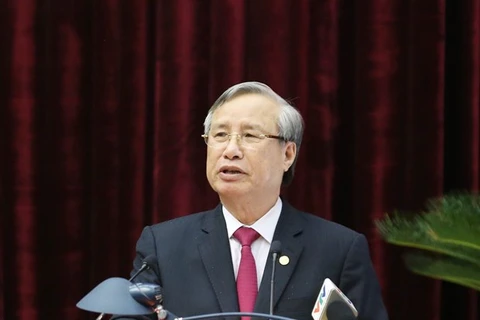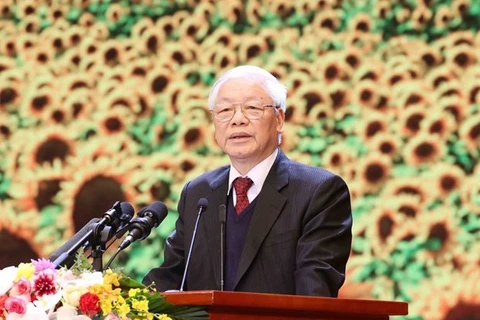Lao Cai (VNA) – Five a.min the morning, smog still covered the whole Ta Co Thang village, the most remote village of the border commune of Trinh Tuong, Bat Xat district, northern mountainous Lao Cai province. The morning cold made Vu A Cac feel creepy. Cac is a young Secretary of the Party Cell of the Ta Co Thang village, who pioneers in promoting production in the border locality.
The 26-year-old Mong man looked back to the village where 24 out of the total 54 households are poor. He repressed his sigh and continued his way to the field where he was cultivating herbal plants instead of maize with the hope of improving the livelihood for local residents.
The pioneer on the new path
“If I don’t lead the way and succeed, I will not able to encourage my villagers to follow,” said Vu A Cac. The secretary of the village’s Party Cell said that for a locality with tough terrain and extreme weather, poverty and hunger will persist if locals only depend on cultivating maize.
During a meeting of the Party Cell in mid-August, 2016, Cac proposed the idea of planting angelica sinensis, and called on all other Party members to cultivate the herbal plant.
But at that time, Mong people in the village were skeptical about his “strange” idea. Cac clearly remembered what they said at that meeting “if you succeed, we will follow suit.”
Despite being disappointed, Cac was still determined to realise his idea. He said that at that time, the price of one kilo of angelica sinensis seed was 4 million VND, which was too much for local residents in the village which has yet to get access to the national power grid. Cac could only manage to buy 200 grammes of the seed. He spent another 1 million VND buying plastic cover.
Without being trained in any agricultural course, Cac had to find documents to learn cultivation techniques.
That year, Cac earned 17 million VND from the new cultivation model, about three times higher than the income from cassava growing.
Recognising the efficiency of the new model, many local households came to learn from his experience.
The young Party cell leader came to the fields to directly guide villagers, while asking for support in varieties from the commune for them.
Aspiration for change
After recalling his first days in the new way, Cac became moody. “The way out of poverty for local residents is as tough as the mountainous path here,” he said.
Due to heavy rain in Ta Co Thang, a large number of angelica sinensis plants were rotten, along with a lack of technical skills, the planting and harvesting process was difficult.
One more time, the enthusiastic Party cell leader spent nights awake to seek new plant for cultivation.
During a visit to Ngai Thau commune in Bat Xat district in2018, Cac found boerhavia diffusa, an herbal plant that needs no fertilizer and is resilient against pesticide and easy to sell.
“I used my monthly allowance (3 million VND per month) for boerhavia diffusa farming. Since then, my family’s income from one hectare farm has been stabled from 50-70 million VND per year, doubling the average income of local households,” said Cac.
His success has encouraged local households to follow suit.
The prestige of the young Party leader among Mong people in Ta Co Thang has been improved significantly.
After graduating from the high school, Cac was among few Youth Union members to be sent to a course to learn about the Party. He was admitted to the Party in 2015 after two years working as Secretary of the Youth Union of Ta Co Thang. However, when he became the Secretary of the Party Cell of the village, many were skeptical about the young leader.
“It was not difficult to understand as I was the youngest in the Party cell,” said Cac.
But his pioneering role in improving the income and livelihood of local people gave him support and confidence of other members of the Party Cell and the whole Mong community in the village.
The Party Cell has drawn many youngsters. So far, it has six members.
Due to the tough terrain and long distance, the households are divided into small groups and each Party member is tasked to be in charge of a group in order to encourage locals to send their children to school, get rid of backward practices and focus on improving their living conditions.
“We call on youngsters to engage in mass movements. Outstanding people have been introduced to join Party studying courses before being admitted to the Party. However, we face many difficulties as many youngsters have left the homeland to work in other places. In 2020, we aim to have two more Party members,” Cac said./.

























